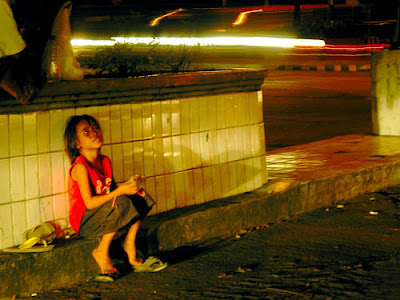Leaping from the shadows into the dimly-lit square in front of Bucharest's principal railway station, the matchstick-thin silhouette of a boy waves his arms frantically at passing cars.
Thirteen year old George Vasile is just one of Romania's many street children - abandoned, neglected, without food, shelter or adequate clothing.
George is far from home - a town 500 kilometres away. His only asset is the empty car space he pays "rent" for, to bigger boys. It's only a temporary possession until a motorist parks there..... perhaps tossing him a coin...perhaps not.
He wears a thin T-shirt and ragged, cotton trousers. His torn shoes flop behind him. He's shivering with cold. I slip my gloves over his grimy, unwashed hands. He nods his thanks.
By midnight, when the last of the commuters have hurried home, the Street Children doss down on the cold stone floor of the Gara de Nord. Others descend into the sewers to seek shelter from the winter winds swirling around the silent station.
In their dark underworld, six metres below, they huddle against the hot water pipes of the sewers, snatching fitful sleep, amid the stench, and scurrying rats resentful of this human invasion of their territory.
At dawn, the children crawl out, covered in rat bites, fleas and sores. They fan out into the market areas scavenging for food and stealing from passers-by.
Some of the girls are child prostitutes. When you are 11 or 12, with nowhere to go and nothing to eat, it seems an easy - and sometimes the only - way to survive.
Unaware of the dangers, they fall pregnant, and their babies die. Those that don't, they abandon because their unformed breasts contain no milk to feed them. Occasionally there is a girl cradling a sickly baby. Some of the children have AIDS, doomed to die before they become adults.
Inside the station, I meet more street children - older this time, some of them openly sniffing glue from plastic bags - a substance they call Aurolac they get from metal polish.
Drugs give temporary relief from their harsh existance. 15 year old Colstel gives me a broad grin as he draws comfort from a cigarette. His mother died and his father remarried, abandoning him and his brothers. Strangely, none of the children ask me for money. They are pleased someone takes an interest - if only a stranger from their own country.
Many of these children are a result of President Ceausescu's tyrannical reign. Even now, twenty years after the collapse of Communism, thousands remain in desperate need - a melting pot of misery, which is Ceausescu's enduring legacy, along with the grandiose buildings and the lavish treasures he laid aside for himself in his 25 years of mis-rule.
After his execution, aid poured in from Britain and elsewhere. Charities arrived in force. Most have now left, and aid money has slowed to a trickle.
To their credit, the Romanian authorities are now doing a great deal themselves, in contrast to Ceausescu's regime.
The Government has launched its Strategy for Protection of Children's Rights - brainchild of the newly-created State Secretary for Child Protection, Doctor Christopher Tabacaru. He became Romania's youngest Minister, aged 29, he's ideally qualified. He's a paediatrician and formerly ran a charity for abandoned children. His plan - encouraging foster care and adoption - aims to reduce the 100,000 children in institutions by 30%.
I ask why children are sleeping down the sewers? Why are Romania's children so much worse off than in other countries? He shrugged and said: "They did not have Ceausescu".
.
.
.
Subscribe to:
Post Comments (Atom)








0 comments: